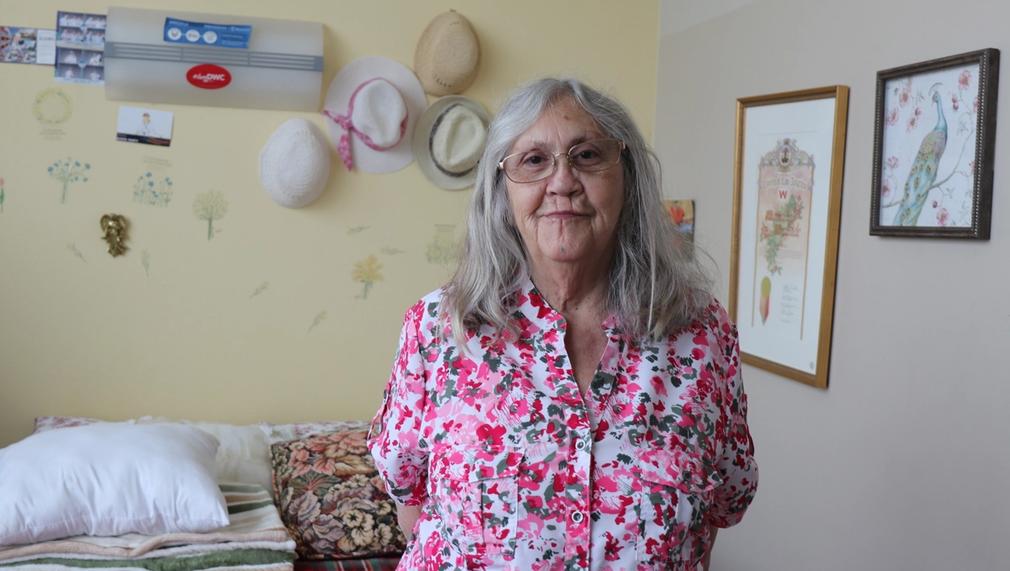Downtown Women’s Center’s Aging in Place Program
DWC’s Aging in Place program combines a highly effective Permanent Supportive Housing (PSH) model for women and gender-diverse individuals experiencing homelessness with services not typically offered in PSH (e.g., a Registered Nurse and Occupational Therapy) to ensure that older adults can maintain supportive housing and address chronic health conditions that threaten their stability. With support from LA2050, DWC will both continue to deliver these services and develop a program manual that will allow us to replicate our successful model.

What is the primary issue area that your application will impact?
Affordable housing and homelessness
In what stage of innovation is this project, program, or initiative?
Expand existing project, program, or initiative (expanding and continuing ongoing, successful work)
What is your understanding of the issue that you are seeking to address?
Across the nation, people aged 50 and older are one of the fasting growing populations experiencing homelessness, currently comprising more than 30% of the homeless population. By 2050, there are expected to be 95,000 older adults living without stable housing–more than double the current population for this age group. Experts in aging suggest that, as the population ages, more people are at risk of poverty and will subsist on limited incomes while housing costs continue skyrocket in many communities. Additionally, although respite care for older adults experiencing both homelessness and health issues has increased nationwide in recent years, there remains an urgent need for long-term solutions that effectively integrate stable housing and healthcare (New York Times, 2024). For example, DWC knows that chronic illness management and mental health supports are critical in helping older adults retain their housing.
Describe the project, program, or initiative this grant will support to address the issue.
DWC’s Aging in Place program addresses chronic physical and mental health issues among older adults in PSH by providing a full-time Registered Nurse (RN) and access to Occupational Therapy. We couple these services with intensive case management services to ensure that our older adult residents, who represent the majority of participants residing at DWC (60%), are able to maintain supportive housing in order to safely age in place. The Aging in Place program is based on the Community Aging in Place – Advancing Better Living for Elders (CAPABLE) model, an evidence-based practice developed by researchers at Johns Hopkins intended to support residents in nursing homes. DWC was the first provider in the nation to introduce this model for PSH. CAPABLE relies on an interdisciplinary team consisting of an RN, Occupational Therapist (OT)/OT interns, Social Worker, Case Manager, and Maintenance Worker to collaboratively assess and address residents’ unique, holistic needs, addressing that physical and mental health barriers that impact the ability to retain housing, and decreasing hospitalization rates for residents in PSH. Participants identified as candidates are assessed by the RN and OT for chronic health, environment, and ability challenges that may threaten their ability to safely age in place. From this assessment, they develop an individualized plan and connect residents to resources. OT interns support with assessments and also provide life-skills workshops for residents.
Describe how Los Angeles County will be different if your work is successful.
DWC’s Aging in Place program addresses barriers faced by our served population, including housing shortages and rapidly rising rental prices which are driving unprecedented numbers of Los Angeles residents out of their homes. The 2023 Greater Los Angeles Homeless Count data reflects this trend within Los Angeles County, as the population of older adults experiencing homelessness has increased by 11% since 2022. This spring, DWC became the service provider for NoHo 5050, a new 32-unit development in North Hollywood. By 2027, DWC will become the service provider for 170 new units of PSH throughout Los Angeles County, including a 97-unit PSH development planned for the site of our current parking lot. With the support of LA2050, DWC will deliver Aging in Place services to existing residents and develop a program manual that will allow us to replicate our existing model—the first of its kind in PSH—as we expand to serve women and gender diverse people in PSH throughout Los Angeles County.
What evidence do you have that this project, program, or initiative is or will be successful, and how will you define and measure success?
The overarching goal DWC’s Aging in Place program is to increase housing stability and ensure older adult residents and those with geriatric health conditions can safely address the chronic health challenges that threaten their stability. DWC’s on-site Registered Nurse and Occupational Therapist will assess eligible and interested residents for chronic health, environment, and ability challenges that threaten stability, with the goal to connect with 70 individuals with histories of homelessness each year and provide support tailored to their unique needs, ensuring 100% of participants receive services to improve their quality of life in PSH. DWC measures qualitative success by the number of participants reporting greater satisfaction with their living situation, deepened social connections through participation in enrichment workshops, and lower stress levels. Within our program, 98% retained their housing in 2023, compared to Los Angeles County’s average PSH retention rate of 92%.
Approximately how many people will be impacted by this project, program, or initiative?
Direct Impact: 70.0
Indirect Impact: 196.0